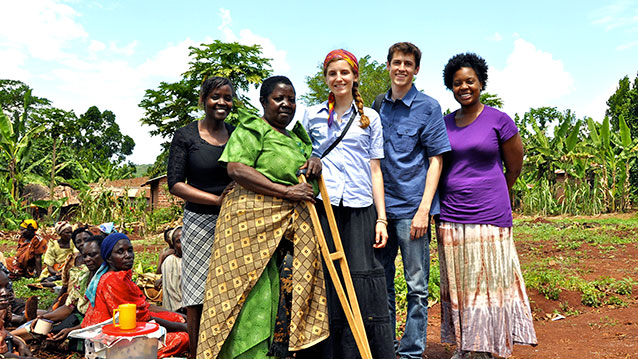EVANSTON, Ill. --- Northwestern University’s innovative service learning and study abroad program, the Global Engagement Studies Institute (GESI), was recently recognized as a national leader for advancing racial, cultural and economic diversity in its international programs.
The honor, the Excellence in Diversifying International Education Award, is given annually by the Diversity Abroad Network, the leading professional consortium dedicated to boosting the number of minority students in international education.
“The timing is significant because it comes as most schools are grappling with the best way to get underrepresented students involved in study abroad programs,” said Brian Hanson, director of programs for the Global Engagement Studies Institute.
“The solutions to today’s most pressing global challenges require the innovation and creativity that emerges from collaboration between people with different skills, perspectives and experiences,” Hanson said.
Northwestern’s program, which offers hands-on learning through a grassroots, internship-based experience, is considered a national model for fostering diversity and inclusion and for making international students feel connected to the U.S. campus environment.
Through service learning in Bolivia, the Dominican Republic, India, Kenya and other countries, teams of students work with local organizations on issues such as health, education, environment, women’s empowerment and microfinance.
The program moves beyond traditional study abroad and “poverty tourism” by offering students collaborative experiential learning -- opportunities that develop global leaders while contributing to the sustainable development of the local communities, Hanson said.
“Over 90 percent of students involved cite the experience as the pinnacle of their learning as well as their most defining, formative experience in college,” Hanson said. “The students also say it has direct implications on their plans throughout and after college, including internships, fellowships, grants, job opportunities and other international experiences.”
Moreover, everyone benefits from increased diversity. Northwestern students from underrepresented groups often adapt easily to new cultural settings and contexts.
“We find students from these backgrounds make unique and essential contributions to their group because they have the ability to better integrate with the host community and figure out how the system works, who has power and how to get things done,” Hanson said.
Northwestern’s model includes both innovative programs and substantial funding. Generous financial aid has been essential in attracting first-generation college students and other underrepresented students, Hanson said.
Over the past four years, the GESI program has awarded over half a million dollars in need-based scholarship funding for qualifying Northwestern students, thanks to substantial support from donors such as Roberta Buffett Elliott and Northwestern trustees Bonnie and Mike Daniels.
The cost of international airfare can be a barrier, even for students who receive a full scholarship to study abroad programs. GESI covers student airfare when it hinders participation, resulting in a major increase in socio-economic diversity among GESI students.
In 2014, nearly 70 percent of Northwestern students participating in GESI were from underrepresented groups, well above the current national average of 25 percent.
“True diversity is more than differences in individual background, personal identities, intellectual approaches and demographics,” said Northwestern President Morton Schapiro. “It also means removing barriers and creating space that allow individuals to fully engage in university life.”
GESI is the Buffett Institute’s primary undergraduate initiative that works to diversify international education and strengthen internationalization on campus. Founded in 2007, GESI is now the university’s largest and most diverse international studies program with approximately half of participants representing underrepresented student populations.
For more information, visit Northwestern University's Buffett Institute


